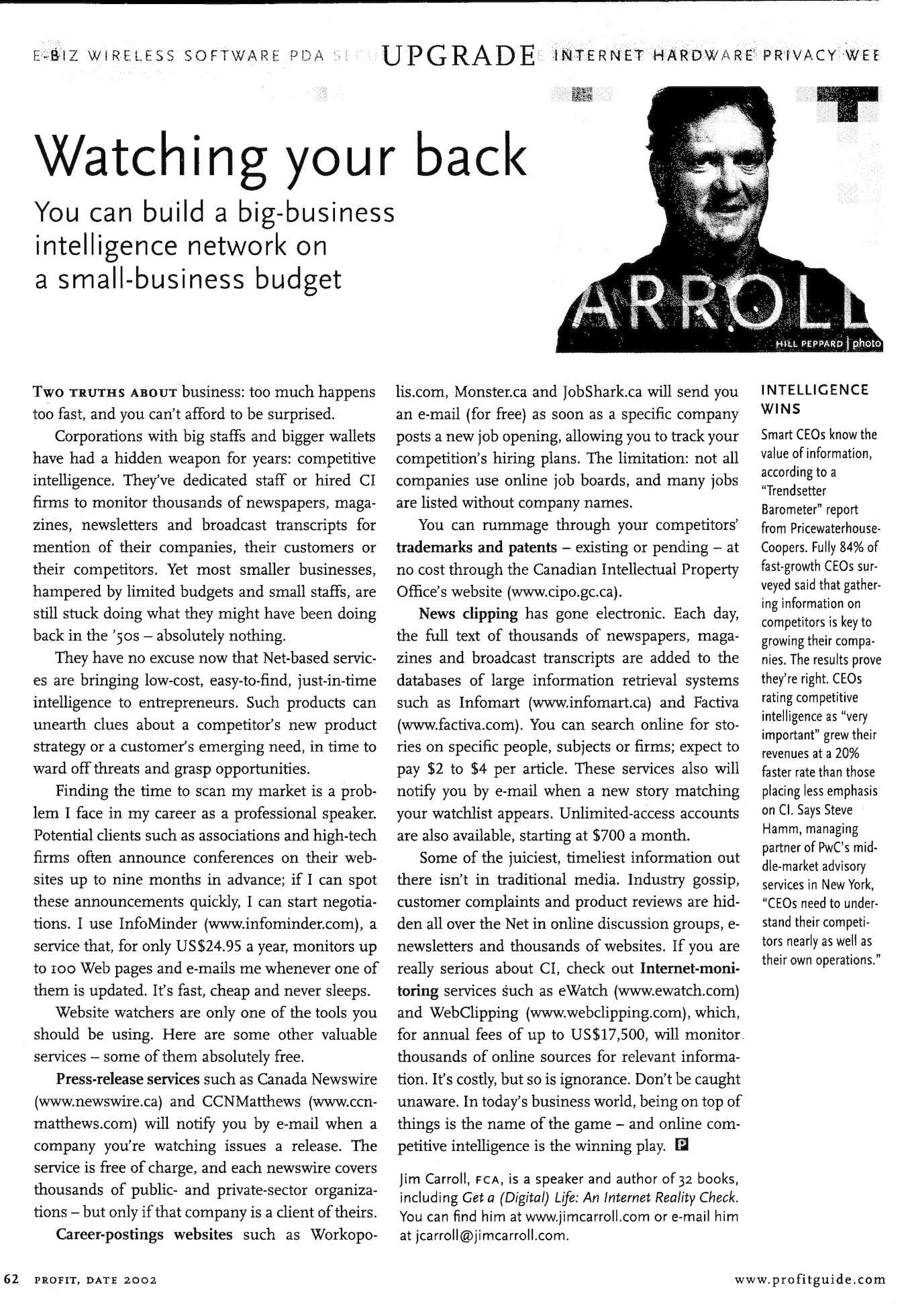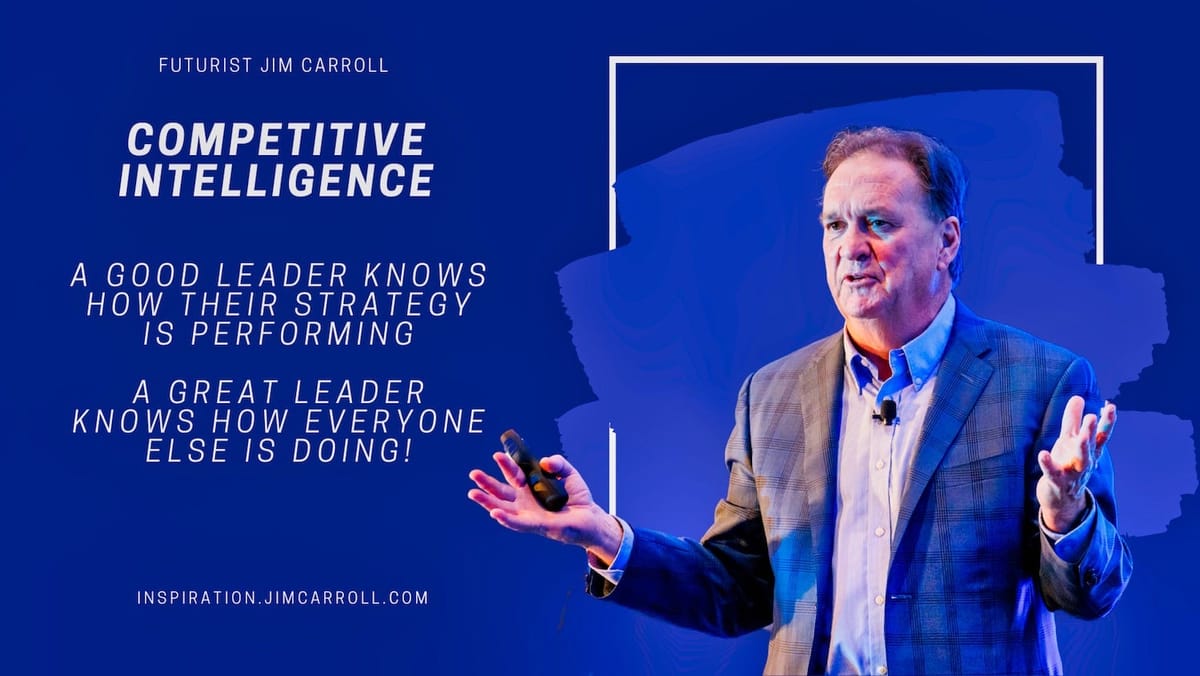For a time in the very early 90s, while making my transition into a career speaking and writing about the future, I spent a few years offering up services on the side as a 'competitive intelligence professional.'
That came to mind last week as a number of people commented on my post about companies refusing to acknowledge their competitors in their day-to-day actions - "If you can't acknowledge your competition, you won't acknowledge your future!' A key point in our email exchange was that not only should we be aware of our competition - we should have deep insight into everything they do!
In other words, competitive intelligence.

What is it? Investopedia describes it this way:
Competitive intelligence, sometimes referred to as corporate intelligence, refers to the ability to gather, analyze, and use information collected on competitors, customers, and other market factors that contribute to a business's competitive advantage.
Back at the time that I was a 'CI' (which sounds so James Bondish...), it was a heady world. A community of individuals weaned on the early days of pre-Internet technology had new technology at our disposal - we could undertake massive news and research service database searches to provide senior executives with deep and up-to-date insight on new competitive challenges, the actions of their main competition, and even what other CEOs were saying and thinking. I would take on a project, do some deep research, grab articles and insight that were otherwise unavailable to the average person, and organize, collate and summarize what I found. I could charge a pretty penny for work, and it was all quite a bit of fun.
Today, this type of thing is all pretty routine - the Web has forever changed the landscape of competitive insight. And yet, the profession and opportunity live on - spend some time cruising through the site of the Strategic and Competitive Intelligence Professionals, and you'll gain insight into a profession offering up valuable services that you probably never knew existed. The fact that the profession continues to grow is due to the fact that keeping on top of the competition is even more important than ever before. Faster moving product innovation, the emergence of new competitors, big bold strategic moves - there are numerous reasons why a CEO today must keep a firm finger on the pulse of all their competition - including those that don't yet exist!
It's fair to say that I still do the work of a CI today - for every one of the keynotes that I prepare for I still make use of a deep research tool known as Dow Jones Factiva. I'm preparing for a keynote next week for a major global infrastructure/construction company, and have on my desk a file of about 1,000 articles having to do with news and trends in their industry, their competition, and more. 40 years on, I'm still using the same type of search tool that helped to carve out the early moments of my unique career. I pay a *significant* monthly fee for use of this tool, but it's my go-to tool for just-in-time knowledge.
CI is a fun topic - I delivered the opening keynote for SCIP in 2005, which was a wonderful career moment. I also wrote about the concept back in 2002 in my column for Profit Magazine. I love the first line:
TWO TRUTHS ABOUT business: too much happens too fast, and you can't afford to be surprised.
'Corporations with big staffs and bigger wallets have had a hidden weapon for years: competitive intelligence. They've had dedicated staff or hired Cl companies to monitor thousands of newspapers, magazines, newsletters and broadcast transcripts for mention of their companies, their customers or their competitors. Yet most smaller businesses, hampered by limited budgets and small staffs, are still stuck doing what they might have been doing back in the '9os - absolutely nothing.
Think about that in the context of today's fast world: too much happens too fast, and you can't afford to be surprised. Check the statistic that I pulled together for the sidebar to the article:
Smart CEOs know the value of information.... fully 84% of first-growth CEOs said that gathering information on their competitors is key to growing their company."

Bottom line? If you aren't aware, you won't survive.
Think intelligence! Competitive intelligence!
But wait: there's more! I managed to find the article that SCIP prepared in advance of my keynote.
Jim Carroll Interview
“Did you know that there are 2.5 million new cell phone users per day in China!”
“Did you know that half of the population in China is under the age of 25!”
“Did you know that in the future only 25% of jobs will require a university education, but all jobs will require similar levels of knowledge?”
Fascinating statistics. Can you see what types of trends are developing from this information?
Join Jim Carroll for a fascinating look at trends and how the CI professional can capitalize on them for success. Jim Carroll will delight the SCIP005 audience with a keynote presentation that will put you in the right frame of mind to better understand tomorrow, today!
Jim is quite familiar with CI and has numerous books on the subject on his bookshelf. He is a self-proclaimed “statistic and news hound” and is always in search of information.
Interestingly enough, Jim began his career as an accountant. But by the mid-1980s, had accumulated a large network of online information sources, and thus was born his company as an information broker. He did a lot of research and a little bit of CI and understands the issues and challenges that many CI professionals have in their positions.
Today, he continues to use electronic sources to monitor what comes next. His love of statistics keeps him constantly looking forward.
We are all well aware that the pace of change in business has increased so rapidly during the last several years, that according to Jim, this should be leading to a renaissance for the discipline of CI. For example, a traditional product life cycle used to be 4 to ten years, whereas now it is 6 months. Organizations need to work harder to stay ahead of the curve. Today, global businesses are experiencing “hyper-innovation.”
Many organizations have been caught “flat-footed” focusing on short-term growth and not watching the future. In the last few years with 9/11 and the dot.com crash, organizations are rebuilding and catching up. This poses an incredible opportunity for CI professionals to explain their roles and value to their organizations. CI, by its very nature, keeps you one step ahead of the competition, therefore “CI is not a luxury but a necessity.” CI is critically important for long-term growth to keep companies successful and forward-focused.
Jim has taken his interest in information and statistics, coupled with his intense curiosity, and has developed a unique ability to “combine thought leadership with deep insight into practical issues associated with implementing strategic decisions.” Don’t fear the future, but understand how emerging trends and threats can be spun into opportunities.
You can’t miss this dynamic presentation! Not only is SCIP honored that Jim Carroll will be speaking at SCIP05, but Jim is delighted as well. There are numerous synergies in the work he does with the work CI professionals do! Jim will wake you up to the trends that affect the way you do business and challenge you to cope with a world that continues to witness a constant, relentless, and dramatic change. He is recognized for his critical thinking and business-oriented view of issues relating to social, consumer, and workplace trends, demographic and lifestyle issues, and emerging technologies, as well as economic and business trends.
Don’t miss this terrific opportunity to hear Jim Carroll at the SCIP05 Annual Conference, Competitive Intelligence for Dynamic Performance. He will present his keynote address on Friday, April 8, 2005, during the general session from 8:30am –10:00am.

